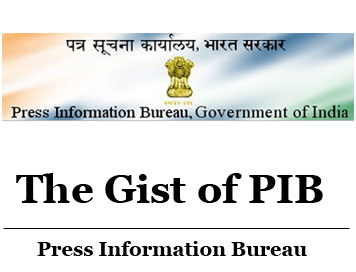(THE GIST OF PIB) Clearing Corporation of India Limited (CCIL)

(THE GIST OF PIB) Clearing Corporation of India Limited (CCIL)
(DECEMBER-2023)
Clearing Corporation of India Limited (CCIL)
- The Reserve Bank of India (RBI) and the Bank of England (BoE) recently signed a Memorandum of Understanding (MoU) for cooperation and exchange of information in relation to the Clearing Corporation of India Limited (CCIL).
About Clearing Corporation of India Limited (CCIL):
- It was set up in April 2001 to provide guaranteed clearing and settlement functions for transactions in money, G-Secs, foreign exchange, and derivative markets.
- CCIL also provides non-guaranteed settlement for Rupee interest rate derivatives and cross-currency transactions through the CLS Bank.
- Promoters: State Bank of India, IDBI Bank Ltd, ICICI Bank Ltd, Life Insurance Corporation of India (LIC), Bank of Baroda and HDFC Bank Ltd.
- The company was incorporated with an authorised equity share capital of Rs. 50 crores.
- CCIL’s adherence to the stringent principles governing its operations as a Financial Market Infrastructure (FMI) has resulted in its recognition as a Qualified Central Counterparty (QCCP) by the Reserve Bank of India in 2014.
- It has also set up a Trade Repository to enable financial institutions to report their transactions in Over-the-Counter (OTC) derivatives.
- Through its fully owned subsidiary, Clearcorp Dealing Systems Limited (CDSL), CCIL has introduced various platforms for the electronic execution of deals in various market segments.
- Further, CDSL has developed, implemented, and manages the NDS-OM, the RBI-owned anonymous electronic trading system for dealing in G-Secs and also for reporting OTC deals, as well as the NDS-CALL platform, which facilitates electronic dealing in the Call, Notice & Term Money market.
- CCIL is also the trade repository for all OTC transactions in the Forex, Interest Rate and Credit derivative transactions.
What is CLS?
- Continuous Linked Settlement (CLS) is an initiative by a consortium of the world’s largest foreign exchange clearing banks to eliminate the settlement risk in foreign exchange transactions.
- The CLS system is run by CLS Bank International, which is solely dedicated to settling foreign exchange trades.
- The CLS Bank was established in 2002 and is owned by the world’s largest banks. It is based in New York, with its main operations in London.
Working:
- Standard foreign exchange transactions involve a settlement risk. As the exchange of the two currencies involved is not simultaneous, the party that sells a currency before receiving the currency purchased from the counterparty is exposed to a certain risk.
- CLS removes settlement risk by using a payment-versus-payment mechanism (“PVP”). This means that you get paid only if you pay.
- On settlement day, each counterparty to the trade pays to CLS the currency it is selling.
- CLS pays out the bought currency only if the sold currency is received.
- In effect, CLS acts as a trusted third party in the settlement process.
- It’s important to note that CLS is not a central counterparty; the trade remains between the two counterparties.
CLICK HERE TO DOWNLOAD FULL PDF
CLICK HERE TO DOWNLOAD UPSC E-BOOKS
Study Material for UPSC General Studies Pre Cum Mains
Get The Gist 1 Year Subscription Online
Click Here to Download More Free Sample Material
<<Go Back To Main Page
Courtesy: PIB


